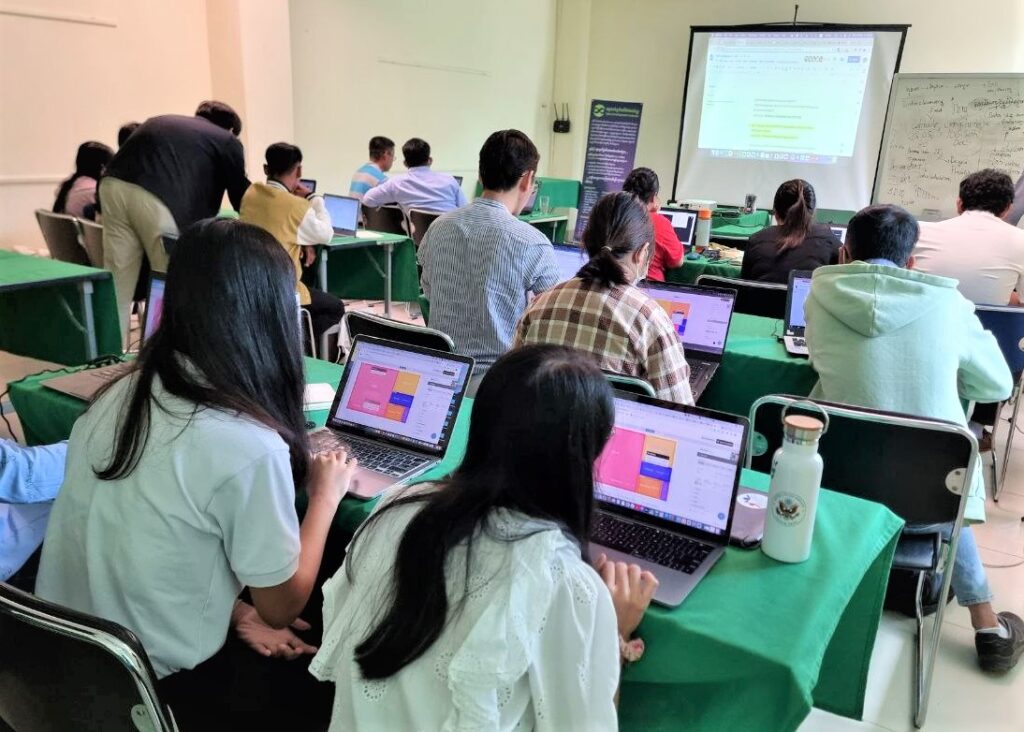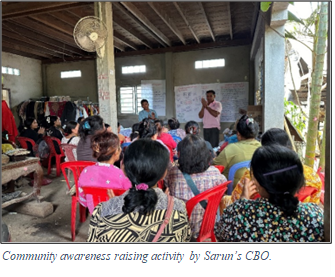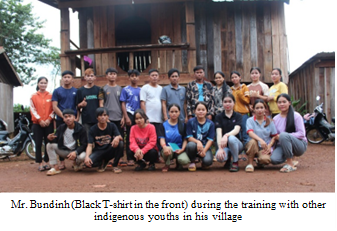KUY SovannChai, 17, is a student at General Education and Technical High School in Siem Reap province. Sovannchai became a member of Pride Corner’s core team after he participated in SOGIESC training conducted by Love in Diversity (LID) on August 30-31, 2023. Being a part of the core team, he frequently shares his knowledge to acquaintances about LGBTQI+ and SOGIESC in order for them to gain better understanding. Sovannchai believes that this is valuable information worth learning and spreading. He expressed satisfaction that CSS, through KYA, established a Pride Corner at his school. He believes that the Pride Corner serves as an exceptional place for fostering information dissemination and discussion related to LGBTQI+ issues.

In addition, Sovannchai applied the knowledge he gained during the training session to participate in an essay competition focused on respect for LGBTQI+ rights and eliminating discrimination. As a result of his efforts, his essay was one of the top ten essays received. The competition was organized by KYA leading up to the Angkor Youth Camp.

In contrast to Sovannchai, HEUN Chanmakara, 22, wasn’t always in agreement with the concept of LGBTQI+. His perception changed following his experience of volunteering with the organizing team for the 9th AYC. Prior to the camp, Makara openly expressed his disapproval of LGBTQI+ individuals during his guest appearance in KYA’s “I Know We Know” podcast. He perceived individuals identified as LGBTQI+ as abnormal and admitted to discriminating against them by avoiding any interaction with them.
Taking part in AYC changed Makara’s mindset when it comes to LGBTQI+ and SOGIESC. Makara expressed that he understands these concepts better than ever before. “If a friend confides in me about their identity as an LGBTQI+ individual in future, they can rest assured that they have a supportive ally who will never discriminate against them”, said Makara.

Similar to Makara, PREM Neth, 19, wasn’t always very familiar with the topic of LGBTQI+ or SOGIESC. After joining the same training that Sovannchai did with KYA and LID, Neth’s view was expanded. Neth shared that it was her first training about the topic and she, along with other students, gained lots of insights from the training, especially various struggles and challenges faced by LGBTQI+ people.
Neth said: “I used to call names to my gay friends making fun of them. I didn’t think that the name calling was hurtful and affected their feelings. It was a mistake that I regret.”
“I have since apologized to them and stopped calling them names. I also encouraged other friends to follow my footsteps as well,” Neth added.
Neth’s story serves as a great example of how a bit of open-mindedness goes a long way. Not only did she change her own mindset, but she is determined to help changing others,’ including those of her own family. Neth expressed that her participation in KYA’s activities met with a lot of questions at first from her parents, but after taking time to explain to them, her parents approved of her involvement with KYA’s activities. PREM Neth is one of KYA’s core members who often participated in KYA’s activities, including sharing sessions
Similar Stories
Data storytelling by data visualization trainees
Data is an essential component of every organization and journalist. Finding the value in data and communicating that value to your target audience needs time. Simply displaying spreadsheets with rows of numbers is insufficient for demonstrating the significance of data. However, when data is presented in the form of a story, individuals are more likely to appreciate its significance and respond accordingly. The good news is that people enjoy reading stories. Storytelling has long been a great tool for educating, explaining, and influencing a specific audience or intended activities. On 20-21 and 26 December 2022, ODC conducted training on “Data Visualization and Storytelling” to equip participants with basic data visualization and storytelling skills. The trainees have learned about the principle of data as well as using data for product visualization and short storytelling. Even though we have a short time, our trainees could produce such a visualization and combine it into a story that could present data. Note: The stories shown do not have further assessment or review. These are just participants\' practice exercises only. Story 1: The special economic zones in Cambodia The trainees produced storytelling by using visualization named \"Most of Cambodia\'s special economic zones do not unveil the specific companies\' number.\" The special economic zones in Cambodia do not show the specific number of companies, indicating that they are still in the planning stages and are not yet operational. It is critical to take more action and complete those projects with high investment capital that follow the regions. Cambodia\'s potential economic zones include Phnom Penh, Kandal, Preah Sihanouk, Svay Rieng, and Koh Kong, based on data. Story 2: Hydropower dam along the Mekong River and energy consumption Visualizations are used to illustrate the number behind the Mekong hydropower dam. Cambodia, Thailand, Laos, Myanmar, and Vietnam all have one thing in common: they would like to build a dam. As regional and global energy consumption and concern about climate change grow, one solution that can help address both at the same time is building hydropower dams in the Mekong region. Vietnam is the leading country in terms of energy consumption, with numbers steadily increasing up until the recent 2020 deadline. One thing is certain: electricity consumption is rising in all countries and shows no signs of slowing. A number of hydropower projects are planned across the five Mekong countries. Myanmar has the most hydropower plans, with a total capacity of 61,412.1 MW. However, the majority of the plans are still in the planning stages, despite the fact that Vietnam has the highest hydropower project operational rate. Renewable energy\'s future is bright, but some argue that it has taken far too long. Story 3: The most potential hydropower sites in Cambodia Our Trainees also used hydropower data from the ODC website to show which provinces have a lot of hydropower. The results show that the majority of hydropower dams are located in Cambodia\'s northeast, specifically in the provinces of Kratie, Stung Treng, and Ratanakiri. Kong Koh province also has a large number of hydropower dams. Story 4: Cambodia\'s deforestation in the last 20 years Indigenous youth from Ratanakiri province created a short story titled \"Is the forest in Cambodia truly lost?\" based on Global Forest Watch data. Data on deforestation in Cambodia show a significant increase from 2001 to 2010 but a slight decrease from 2011 to 2021. Story 5: Fishing trend by region between 2009 and 2019 in Cambodia In the short storytelling using visualization \"Fishing Activities by Zones,\" fishing zones such as the plain zone, Tonle Sap zone, plateau/mountain zone, and coastal zone are depicted. Cambodia has 20 provinces with Community Fisheries (CFi). In comparison to the other 19 provinces, Koh Kong Province has the most CFis, followed by Pursat and Prey Veng. The CFis in Svay Rieng is the fewest.
Shifting attitudes towards sexual harassment
Mr. Oeun Sarun is a 71-year-old CBO leader in Thmey village, Bansay Treng commune, Thmor Kol district, Battambang province. He leads a CBO called “Sahakum Morodak Phum Thmey,” which was selected as one of the cluster members in the Together for Gender Justice (T4GJ) project in October 2022. Mr. Oeun Sarun is a 71-year-old CBO leader in Thmey village, Bansay Treng commune, Thmor Kol district, Battambang province. He leads a CBO called “Sahakum Morodak Phum Thmey,” which was selected as one of the cluster members in the Together for Gender Justice (T4GJ) project in October 2022. Similar to other CBO leaders participating in the T4GJ project, Mr. Sarun facilitated community meetings to share knowledge and understanding of sexual harassment so that participants can further spread the knowledge to the family and neighbors. In his own time, he also continuously disseminated his knowledge to his neighbors and friends as well. He observed that his family and community gradually changed their thinking on sexual harassment, by reflecting on what they did in the past and how they can prevent it now and in the future.
From trainee to trainer: fostering indigenous youths’ capacity to proactively disseminate knowledge in their communities
The Civil Society Activity (CSS) project made significant progress in empowering indigenous voices, through its partnership with Open Development Cambodia (ODC) and Conserve Indigenous People\'s Language (CIPL) Organization. Acknowledging the limitations of training every community member, the project employed a strategic approach: transmitting knowledge from focal persons to their communities. These designated individuals have become conduits for information dissemination, resulting in a profound impact. Mr. Lao Bundinh is a 27-year-old Jarai indigenous youth living with his family in Pak Thum village, Pak Nhai commune, Ou Yadav district, Ratanakiri province. He had limited knowledge regarding social media, script writing, and other technological tools. Nevertheless, he had a strong desire to share his culture and voice with a wider audience through social media channels. He also faced a significant knowledge gap, particularly in the realm of digital security. Throughout his active participation in project activities, training sessions, and engagement with local authorities, he gained valuable insights and became aware of the knowledge gaps he needed to address. Despite encountering various challenges, including barriers related to knowledge, technical skills, and time constraints, he persevered and continued to pursue higher levels of expertise. He seized the opportunity to undertake the role of a trainer, conveying his acquired knowledge to indigenous youths within his community. His training sessions focused on topics such as Facebook security, Telegram two-step verification, and video production scripting. He also has gained the capability to express his insights and address community issues effectively through social media channels while sharing his knowledge within his community. He takes great pride in his personal growth and achievements, having reached this significant milestone. He remains committed to ongoing knowledge sharing and making contributions to increasing awareness among indigenous communities in the future.


